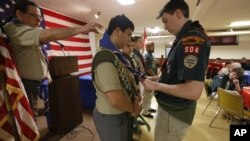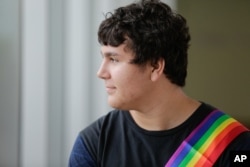David Fite had already earned the 21 Boy Scout merit badges needed to earn the coveted rank of Eagle. But he still had to complete a community service project.
Now 16, he'd always been a gung-ho scout, dutiful, polite and committed. But he'd also been disappointed with the organization's longstanding ban on openly gay scouts and leaders, so much so that he'd considered quitting. "I knew it wasn't right," said Fite, who has many family friends who are gay or lesbian — some of them honorary "aunts" and "uncles" who've given him money for camp and other scouting projects over the years.
Instead of leaving his beloved Troop 115, the usually quiet teen decided to make some noise, writing letters and speaking out with other scouts and adults who also opposed the bans. And he knew his Eagle project was his best chance to make a statement. Though the Boy Scouts lifted the ban on openly gay scouts in 2013, the ban on gay leaders remained when laid out his proposal early last year: community service projects in Chicago's main gay and lesbian neighborhood.
It's what a Boy Scout does, he said — stands up for his family and his community.
"In my mind, I knew I was doing the right thing," he said.
His plan had two parts. First, he, family members, including his mother, Jennifer Fite, and grandparents, and a group of volunteers and students at Chicago's Nettelhorst School would decorate around the school for the nearby Gay Pride Parade in June 2015.
Then he and his mom would host a meal and dance party and distribute backpacks, transit cards and other gifts for young people who gather regularly for support and socializing at the Center on Halsted, which serves Chicago's lesbian, gay, transgender and bisexual residents. Some are homeless or "couch surfing" with friends because their families have kicked them out.
It was shortly after Fite completed his Eagle project that the Boy Scouts lifted their ban on openly gay leaders, too. These changes have not been without controversy. Several religious denominations, including Mormon and Southern Baptist, collectively sponsor close to half of all Scout units. In response to the changes in policies on openly gay scouts and leaders, some churches have considered creating their own scouting organization.
Boy Scout officials in states such as Utah also say they've had trouble raising funds since the bans were lifted.
For Fite, part of his Eagle project's purpose was to show the gay community "that not everybody in the Boy Scouts is like that."
In September, he made his final project presentation to the local Scout council, detailing what he had done and showing photos. He entered the session nervously, but emerged smiling broadly: He won final approval. He received his Eagle award at a ceremony at a Roman Catholic Mass last month — and said earning the award on his own terms felt important.
"I'm also proud of the Boy Scout organization for making this change and being the change that other people want to see in the world," he said. "I think it says that if you fight hard enough, you can change anything."





